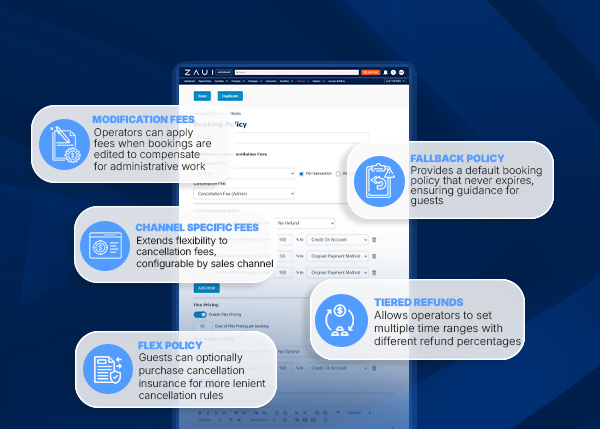Zaui’s New Booking Policy Toolkit: Flexible Cancellations, Smarter Revenue Protection

Zaui’s New Booking Policy Toolkit: Flexible Cancellations, Smarter Revenue Protection

The travel-tech world is changing fast, and tour and activity operators need policies that are flexible for guests but still protect their revenue. Zaui is introducing a major improvement to its reservation software with a new Booking Policy feature. While Zaui has always offered cancellation rules and self-service edits, this update gives operators more control, makes policies clearer for guests, and helps staff manage bookings more easily. Here’s a closer look at what’s new and how it can benefit your business.
With This Update, Zaui Transforms Cancellation Rules into a Full Booking Policy Toolkit
The Booking Policies feature gives operators more flexibility to manage cancellations, modifications, and additional fees, all in one place. It’s designed to be clear and fair for guests while making it easier for staff to manage bookings and enforce policies consistently. This update reflects the growing need for flexible, guest-friendly options that still protect your revenue.

The update aims to achieve several goals:
- Provide a fallback policy that always applies if no other valid policy exists. Every system will now come with a default booking policy that never expires, similar to how a default timetable works. This ensures that even if an operator hasn’t configured specific rules for an activity, guests aren’t left without guidance.
- Allow tiered refund structures based on how far in advance a guest cancels. Operators can set multiple time ranges (e.g., 0-24 hours, 24-50 hours, etc.) and assign different refund percentages and refund methods (credit on account or back to the original payment method).
- Introduce modification fees alongside cancellation fees. Operators can apply fees when bookings are edited, either per transaction or per booking, to compensate for the administrative work caused by changes.
- Add a Flex Policy (cancellation insurance) that guests can optionally purchase during checkout. This policy provides more lenient cancellation rules, giving travelers confidence to book while generating a modest additional revenue stream.
- Facilitate channel‑specific fees. Zaui’s system already lets operators pass booking fees to customers and configure these fees by sales channel. The new booking policy extends this flexibility to cancellation and modification fees, so operators can decide whether to charge a fee when bookings are cancelled through the core back office, an online portal or a partner channel.
In short, the update transforms the cancellation rules into a comprehensive booking policy toolkit, enabling operators to customize how bookings are cancelled, changed and refunded with fairness for guests and protection for business revenues.
Default Policy and Activity‑Specific Overrides
The Fallback Default Policy
Each Zaui account will now contain a default booking policy with a start date that matches when the feature is enabled and no expiry date. This default acts as a fallback whenever there isn’t a more specific policy in effect for a booking, the default rules apply automatically. This mirrors Zaui’s default timetable concept and eliminates situations where a booking might lack a valid cancellation rule due to misconfiguration. Operators cannot delete the default policy, but they can edit its details (refund percentages, time windows, flex policy pricing, etc.).
The default policy covers all activities by default. However, operators can still assign specific policies to individual activities if certain tours require different cancellation windows or refund rules. For example, a helicopter tour might require 48‑hour notice for cancellations while a walking tour might allow 24 hours. The system therefore supports both global and granular configurations. The interface indicates when a default policy is in use and allows you to select an alternate policy for a particular activity.
Editing and Viewing Policies
The revamped interface organizes policies in a clean list. Each policy shows its start date, expiry date and whether it is the default. Within each policy you can define:
- Time ranges before the activity starts (e.g., 0-24 hours, 25-49 hours, etc.).
- Refund action for each range, no refund, refund to original payment method or credit on account.
- Refund percentage, if you wish to return only part of the amount.
- Cancellation fee and modification fee, which we discuss later.
- Flex policy pricing and description (optional).
This modular design makes it easier to adjust policies as business needs change and to explain the rules to staff and customers.
Customizing Refund Windows & Methods

At the heart of the booking policy are the refund rules. You can set multiple time windows before the activity starts, each with its own refund method and percentage. Here’s an example of what it looks like in the the default policy:
This means if a guest cancels within 24 hours of the tour, they receive no refund; if they cancel between 25 and 49 hours, they receive half of what they paid as credit on account; and if they cancel at least 50 hours before, they get a full refund back to their original payment method. These thresholds are entirely configurable. You could add more ranges or use different percentages. Additionally, operators can choose to refund credit on account even when a credit card was used. This flexibility enables creative policies that balance customer goodwill with business stability.
Research into pricing psychology suggests that transparency about fees and refund rules builds trust. By clearly defining the refund window and method for each tier, Zaui’s new booking policy ensures guests understand exactly what will happen if they cancel.
Handling Cash, Debit & Gift Certificates
One nuance with refund methods is handling payment types that cannot be refunded automatically online. If a customer paid via cash or debit, the system cannot issue a direct refund to the card. In such cases, the new policy interface automatically refunds via credit on account and displays a pop‑up explaining the situation. Similarly, if a guest used a gift certificate or pass, the refund goes back to the original certificate, and if the certificate is expired, the refund becomes credit on account. These rules ensure operators can deliver fair outcomes while respecting payment limitations.
Introducing Cancellation & Modification Fees
Why Charge Fees?
Cancellations can cost operators revenue: empty seats, lost preparation time, and administrative overhead. Many businesses recoup that loss by charging a cancellation fee. Adding a transparent service fee to online bookings helps operators recover distribution costs without raising base tour prices. In the same spirit, the new booking policy supports cancellation fees and modification fees. Operators can charge a flat amount or a percentage of the booking value when a guest cancels or changes a reservation.
Configuring Fees in Zaui: Per Transaction vs. Per Booking
Fees are set up under Settings → Pricing → Taxes & Fees. Modification fees can be charged per transaction or per booking:
- Per transaction: A fee applies every time a booking is edited. If a guest changes their date, then later updates the number of guests, each change triggers a fee.
- Per booking: The fee applies only once per booking, regardless of how many edits are made. This encourages guests to update everything at once and prevents them from being punished for multiple small changes.
This distinction gives operators control over how to handle change requests. It also mirrors Zaui’s self‑edit functionality,which allows guests to edit booking details before the activity. The new booking policy expands on that concept by letting operators monetize edits when they involve price changes or administrative complexity.
When Fees Apply
Importantly, modification fees are not charged for edits that don’t affect the price, such as correcting a guest name or updating an email address. Fees only apply when a change increases the price of the booking (e.g., adding passengers or selecting a more expensive option). If a change decreases the price or has no cost impact, the modification fee is waived. This ensures fairness and avoids penalizing customers for simple corrections.
Optional Flex Policy: Cancellation Insurance

One of the standout additions in this release is the Flex Policy, essentially a built‑in form of cancellation insurance. Customers can add the flex option during checkout for a small fee, granting them a more forgiving cancellation window. The demo illustrated how, for a particular activity, the flex policy allowed cancellations up to 12 hours before departure instead of 24 hours, with refunds issued as credit on account.
The pricing for the flex policy is defined directly within the booking policy. Operators can set a flat or percentage fee and add a description explaining the benefit (e.g., “Get peace of mind with flexible cancellation up to 12 hours before departure”). The flex fee itself is non‑refundable, and it does not waive the base cancellation fee. However, the extra flexibility may encourage guests to add it to their cart, generating ancillary revenue while reducing no‑show risk.
The introduction of flex policies aligns with broader industry trends. Zaui’s partnership with Copernican, a cancellation management platform, highlighted the importance of flexible policies that meet guests halfway. Copernican’s “Cancellation+” feature offers similar insurance‑like flexibility. By adding native flex policies, Zaui brings that experience in‑house, simplifying administration and giving operators more control over pricing.
Application to Activities and Channel Partners
While the default policy applies globally, operators may override it on a per‑activity basis. This is particularly useful for resellers or marketplaces where different suppliers have their own cancellation terms. Activities can have specific policies assigned, ensuring you respect your partners’ rules while still falling back to your default when none is defined.
Policies also support channel partners and sales portals. For example, you might choose to waive cancellation fees for direct phone bookings but charge them for online channel‑partner bookings. Zaui’s flexible fee setup enables this differentiation, aligning with the platform’s general capability to apply fees only to certain channels.
Transparent Customer Experience
One of the guiding principles behind the new booking policy is transparency. The customer‑facing screens clearly display whether the flex policy is included and, if not, show a badge that says “Flex excluded.” When a guest chooses to cancel or modify a booking, the system displays a detailed breakdown of the refund amount, including any cancellation fees and the timing of the cancellation. A link labeled “Show details” expands to reveal the original total, the refund percentage, the calculated fee and the final refund.
This level of clarity addresses consumer concerns that hidden fees and last‑minute surprises damage trust. A study shows that when fees are disclosed up front and guests understand why they are charged, they are more accepting and even spend more. By showing all amounts and explaining the flex policy difference, Zaui helps guests feel confident in their booking.
The refund process also respects different payment methods. If guests paid by credit card, they receive refunds to the same card; if they used cash, debit or passes, refunds become credit on account with a clear explanation. This reduces manual intervention for staff and ensures
Best Practices for Implementing the New Booking Policy

Given the flexibility the new feature offers, here are some best practices for operators:
- Analyze your cancellation rate and guest behavior. Understanding your own cancellation rate helps you design a fair policy. Look at how often guests cancel and how far in advance. If cancellations rarely happen at the last minute, you might adopt a lenient policy; if they are common, you may need stricter rules or higher fees.
- Balance flexibility with revenue protection. Aim for a policy that encourages bookings but doesn’t expose you to excessive loss. A policy that is too strict can scare off customers, while one that’s too lenient might lead to revenue loss. Use Zaui’s tiered refund options to find the sweet spot.
- Communicate clearly and consistently. Make sure the cancellation terms (including fees and flex policy options) are visible in your booking engine, confirmation emails and pre‑arrival communications. Clear communication mitigates disputes and builds trust.
- Use channel‑specific fees strategically. If a channel partner like an OTA charges high commissions, you may decide to pass on a cancellation fee only for that channel. The ability to apply fees by sales channel allows you to tailor your strategy.
- Monitor the impact of modification fees. Decide whether to charge per transaction or per booking based on your customer behavior. A per‑booking fee may be more customer friendly, while a per‑transaction fee could deter frequent changes that disrupt inventory.
- Leverage the flex policy to increase bookings. Offering a flex option can make customers feel more secure about booking early, particularly for higher‑value tours or uncertain travel conditions. Set the flex fee at a level that covers potential refunds but remains attractive to guests.
Final Word

Zaui’s Booking Policy release is a substantial step forward for tour and transport operators who want to offer fair yet revenue‑conscious cancellation and modification rules. Introducing tiered refunds, fees, flex options, and channel‑specific configurations, the platform provides a toolset that adapts to diverse business models.
As the travel industry continues to rebound and evolve, flexible policies will be a competitive differentiator. With the Booking Policy update, Zaui equips operators with the tools to keep guests happy, recover costs and maintain operational control. Whether you run a small adventure tour or a multi‑route transport operation, this new feature allows you to design policies that fit your business and your customers, propelling you into a more resilient future.
Related Posts

What to Look for in a Travel Booking Software in 2026
Discover the essential features to consider when selecting a travel booking software in 2026 to streamline your travel booking process and enhance customer experience.


Frequently Asked Questions
No. Zaui’s pricing is fully pay-as-you-go. You aren’t locked into any long-term contract. In fact, leading platforms emphasize this flexibility. Similarly, Zaui lets you start and stop anytime. You can change or cancel your plan freely, so you only pay for what you use.
Absolutely not. Zaui’s pricing is 100% transparent. We disclose all fees up front with no surprise add-ons or “sneak-in” charges. In fact, Zaui’s plans include all core features “without additional fees”. Industry experts note that hidden fees undermine trust so we avoid them entirely. All costs are clearly outlined in our pricing, and there are no extra setup charges or undisclosed surcharges at checkout.
Zaui integrates with major payment gateways (e.g. Stripe) so you only pay standard credit-card processing rates (roughly 1.9%+$0.30/transaction) and we don’t mark them up. Only the published platform commission is added on bookings. You also have full control over who pays the commission, we let you decide whether to absorb booking fees or pass them on to customers. In short, you’ll only pay the transparent booking commission and normal gateway fees, nothing extra.
Your onboarding and support are included in the price. We provide white-glove setup help and ongoing 24/7 support at no additional cost. Our dedicated customer-success team will guide you through every step, ensuring a smooth launch. You won’t pay extra for training or service other than the onboarding fee; it's all built into your plan.
You can schedule a free demo with our team. Our Zaui ninjas will walk you through pe how Zaui can work for your business and highlight opportunities to grow with our advanced features all without any upfront payment. This way, you can feel confident it’s the right fit before making a commitment.
Of course. Zaui’s plans are fully flexible. You can upgrade or downgrade at any time to match your needs, without penalties. You can move to a higher tier or back down easily, and your billing adjusts automatically.
No. Zaui does not charge its commission on offline/manual bookings. “No fees on offline bookings” You only pay the commission when a booking is processed online through our system. Manual reservations (or bookings from partner channels we set up for you) incur no extra platform fee. (30% or less)
All of Zaui’s core features are included in your plan at no extra charge. We believe in value and transparency: Zaui provides over 15 advanced features (Google Things to do, reporting tools, marketing tools, reports, etc.) at no additional cost. Many competitors charge extra or require higher plans for the same features, but with Zaui you get the full suite of tools in one package. Any optional add-ons (if any) will always be clearly listed and optional there are no surprise paid upgrades for standard features.
Each Zaui plan is designed for clarity and fairness, following industry best practices. You can trust that our pricing is transparent and flexible, with the support you need built in.
Extra accounts- unlimited agents, resellers, user




.png)
